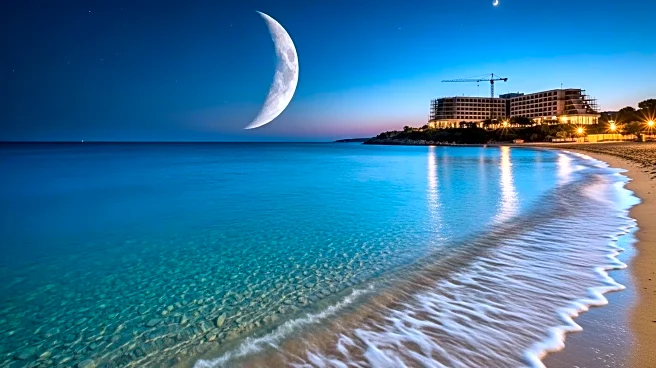What is the story about?
What's Happening?
Local authorities on the Cycladic island of Milos have revoked the building license for a five-star hotel planned on the famous 'moon beach.' The decision was made after the municipality's planning department found that the project did not meet inspection standards, lacking necessary approvals and documentation. The hotel was to be built across a vast area of pumice-white rocks, featuring swimming pools and cave villas overlooking the Aegean Sea. The halt comes amid growing public outcry and environmental concerns over the impact of such developments on the island's natural beauty. Milos' mayor, Manolis Mikelis, faced significant pressure from campaigners who view the project as a threat to the island's ecosystem.
Why It's Important?
The decision to halt the hotel construction is significant as it highlights the ongoing tension between development and environmental preservation in Greece. The Cycladic islands, including Milos, are under pressure from investors seeking to capitalize on the booming tourism industry, which attracted 36.1 million visitors last year. This development spree is feared to threaten the fragile ecosystems of these islands. Environmental campaigners argue that unchecked construction could lead to irreversible damage to the islands' natural and cultural heritage. The halt represents a victory for those advocating for sustainable tourism and stricter enforcement of zoning laws.
What's Next?
The halt in construction may lead to increased scrutiny of similar projects across the Cycladic islands. Environmental groups are likely to continue their advocacy for sustainable development practices, urging the Greek government to enforce stricter regulations. The Ministry of Environment may face pressure to take more decisive action to protect the islands' ecosystems. Additionally, the decision could inspire more grassroots movements to challenge overdevelopment and promote sustainable tourism models.
Beyond the Headlines
The halt of the Milos hotel project underscores the broader issue of balancing economic growth with environmental sustainability. As Greece emerges from its economic crisis, the temptation to exploit natural resources for short-term gains poses ethical and cultural challenges. The decision may prompt a reevaluation of how tourism and development are approached in ecologically sensitive areas, potentially leading to long-term shifts in policy and public attitudes towards conservation.

















